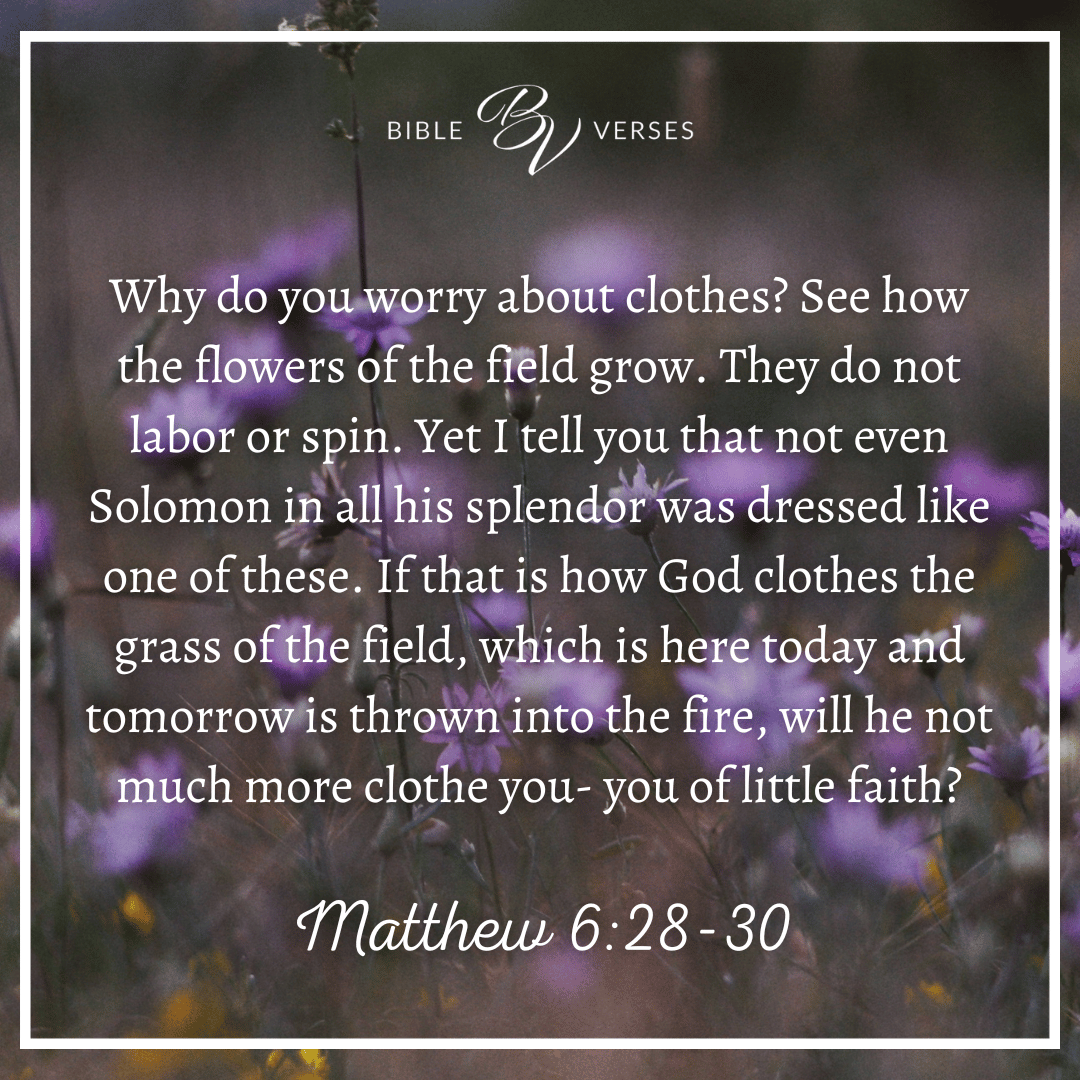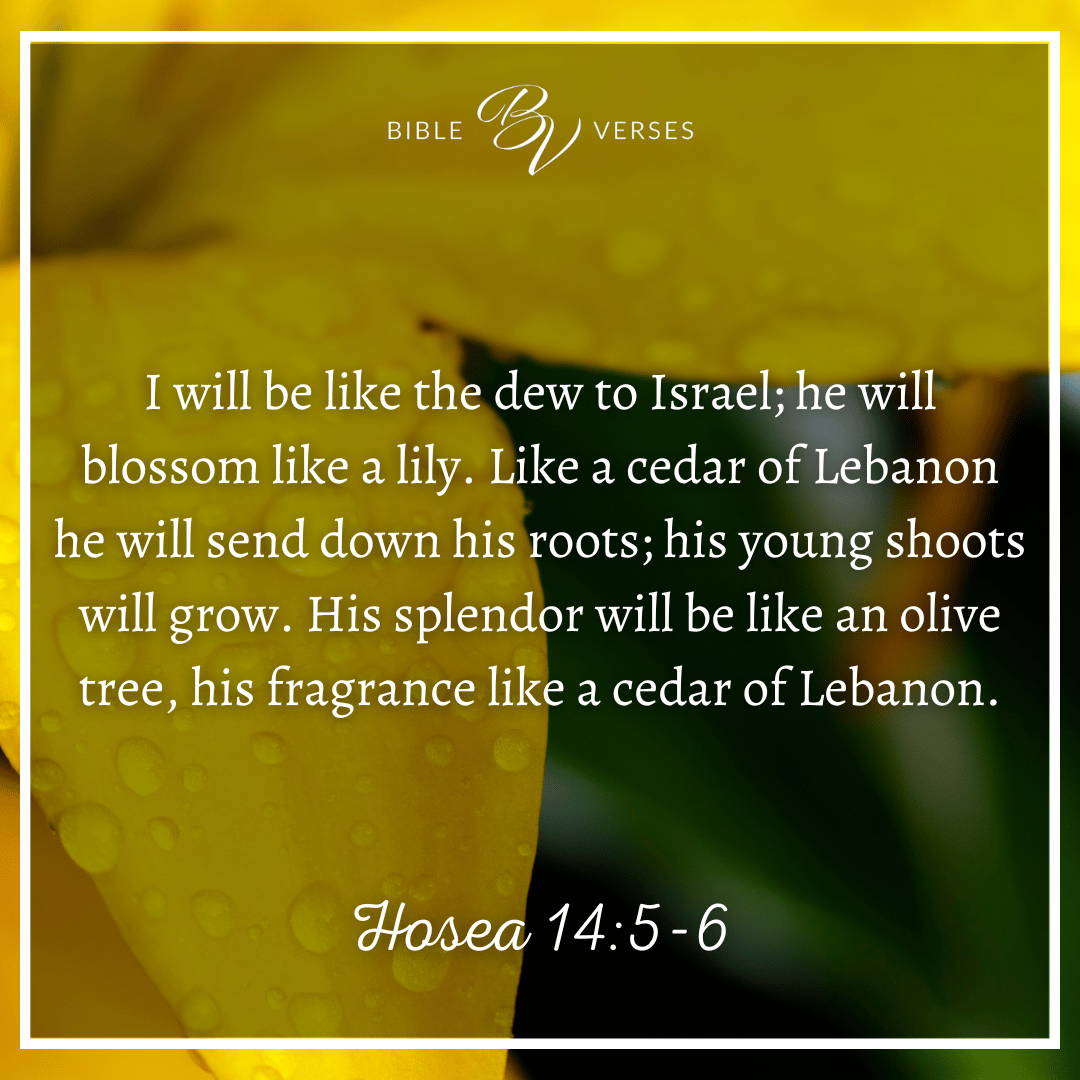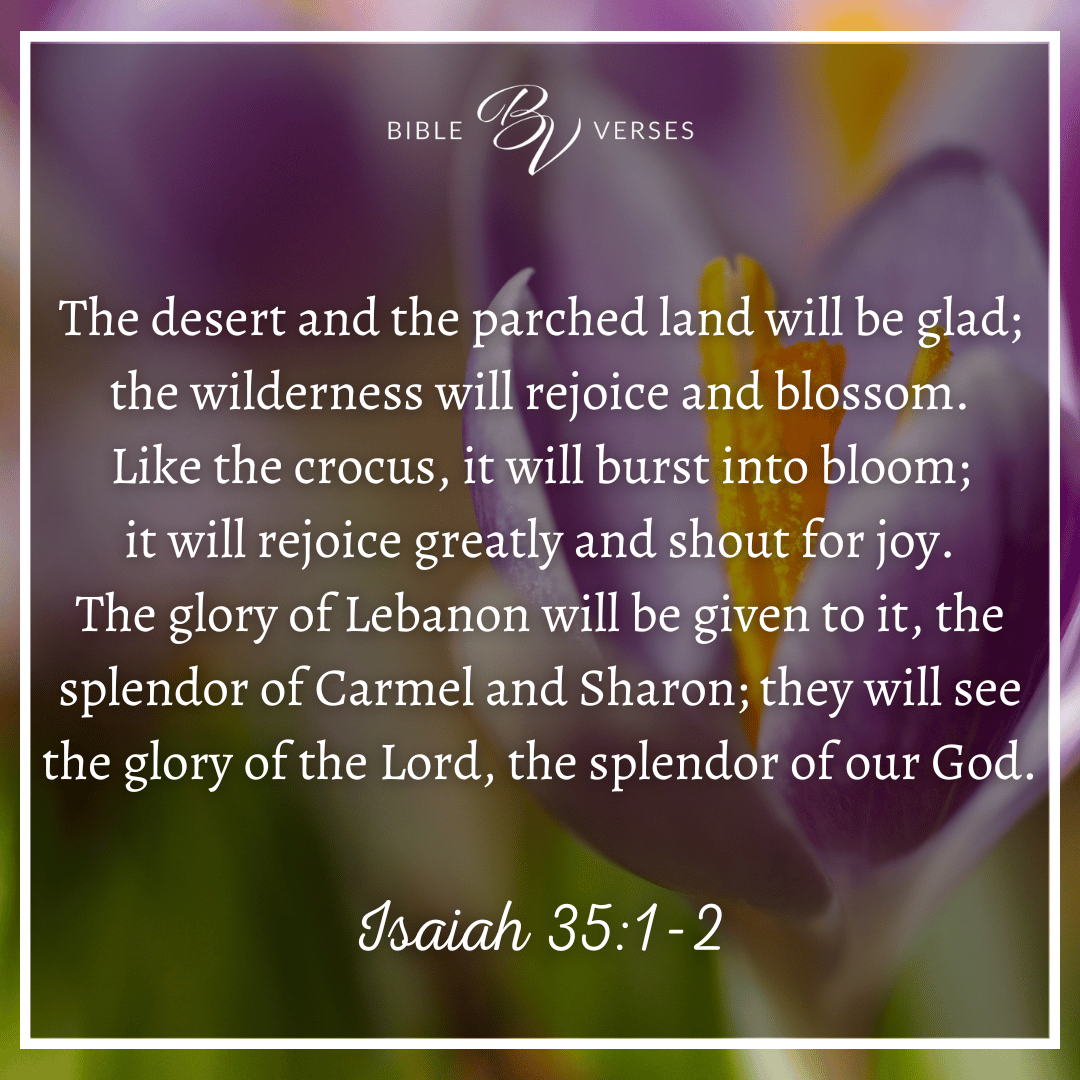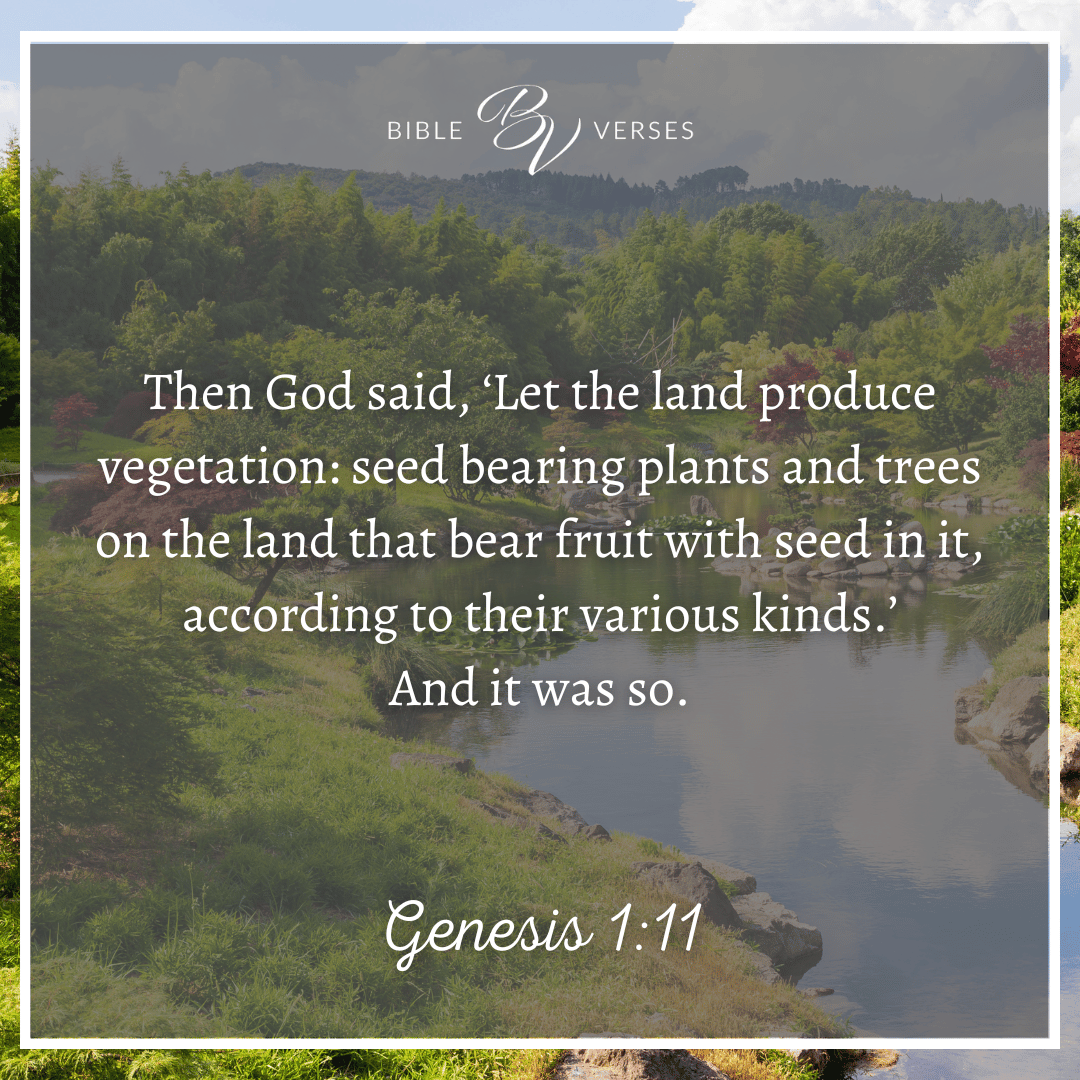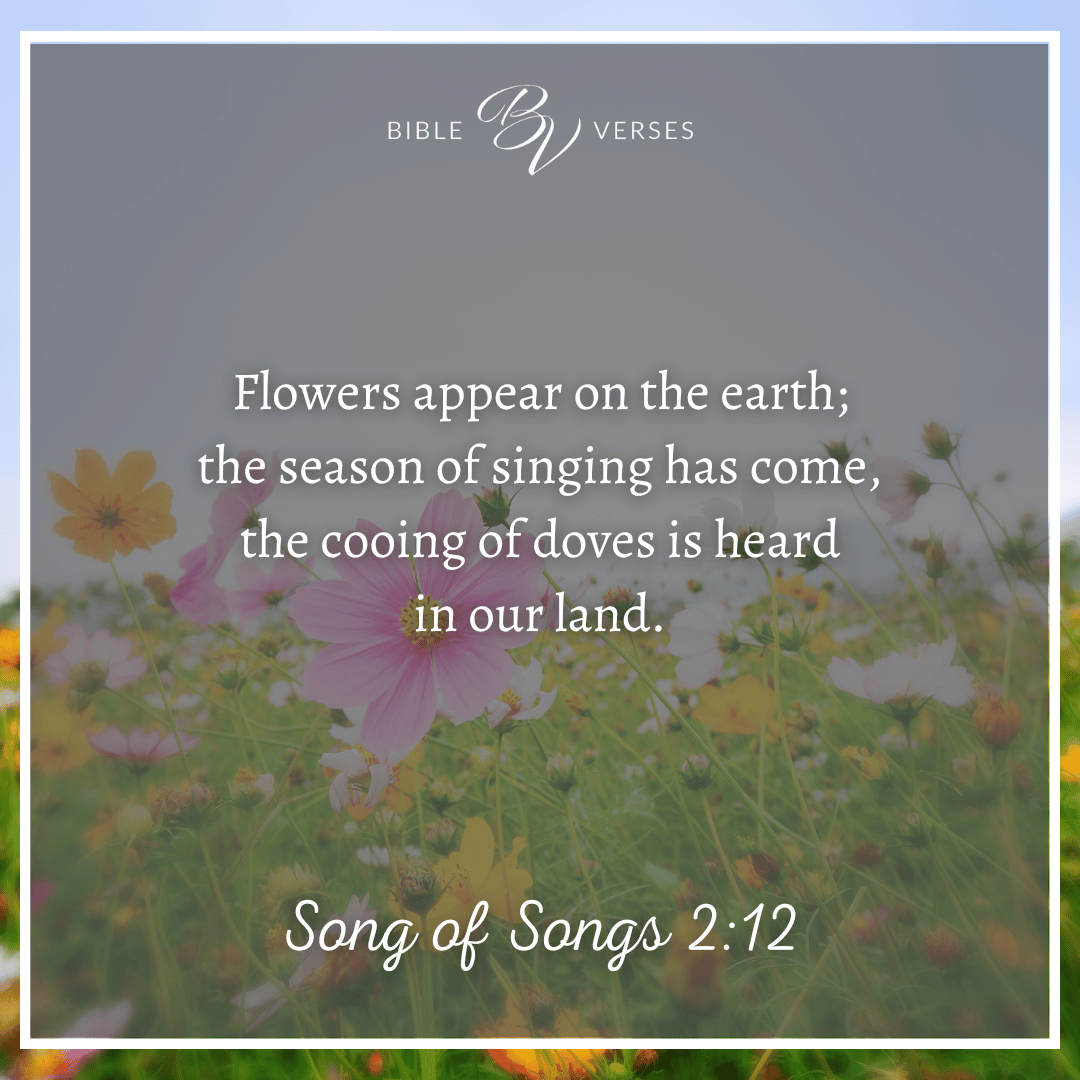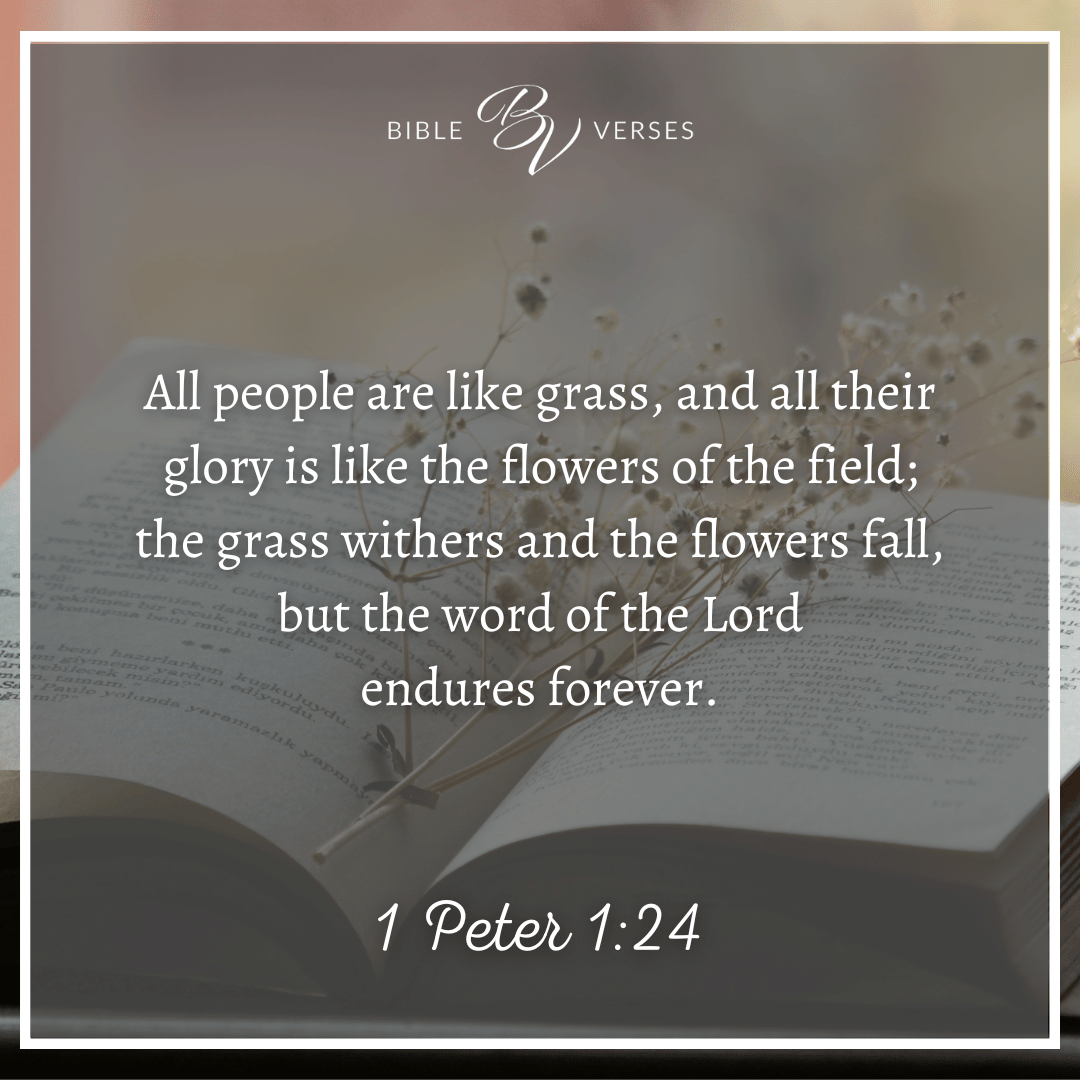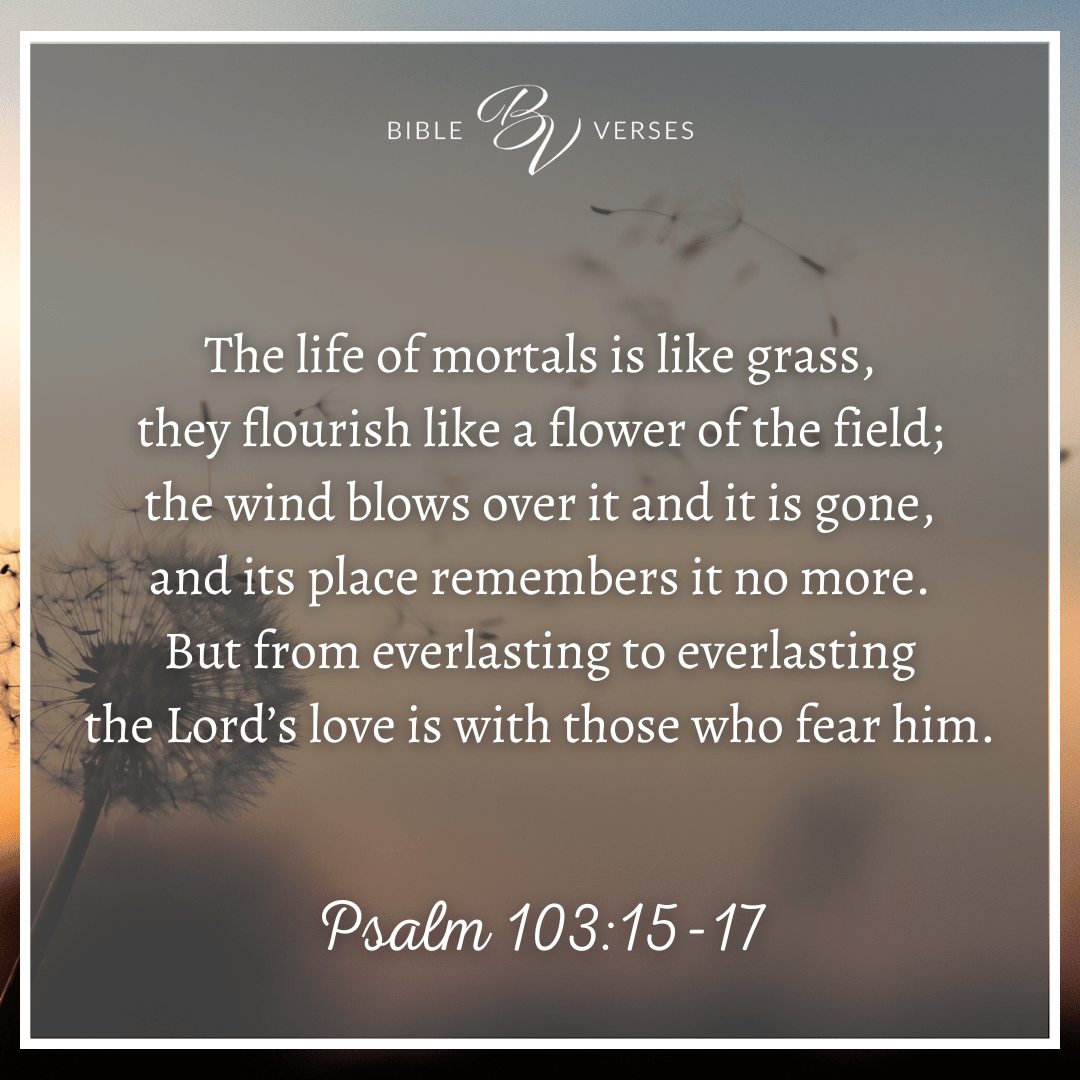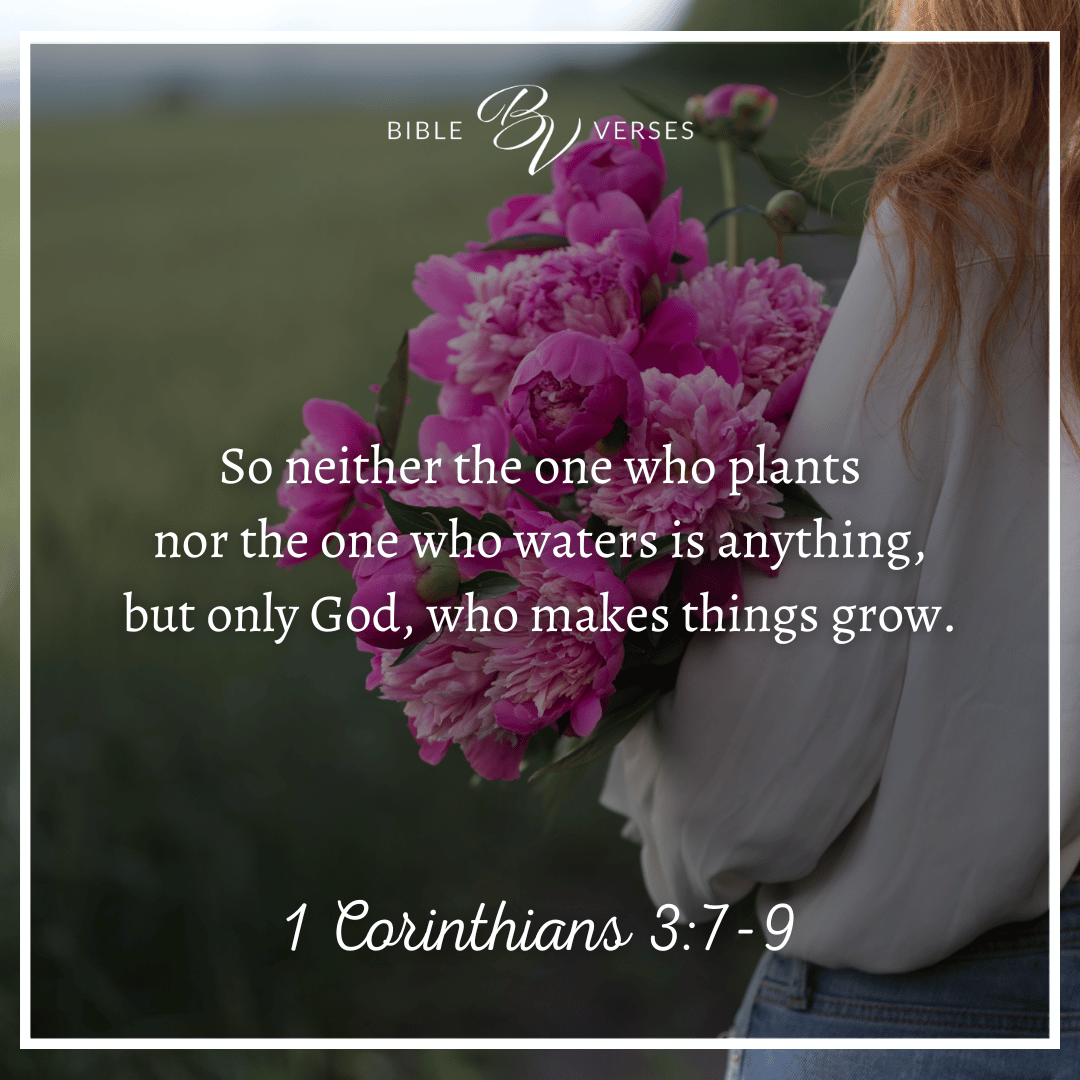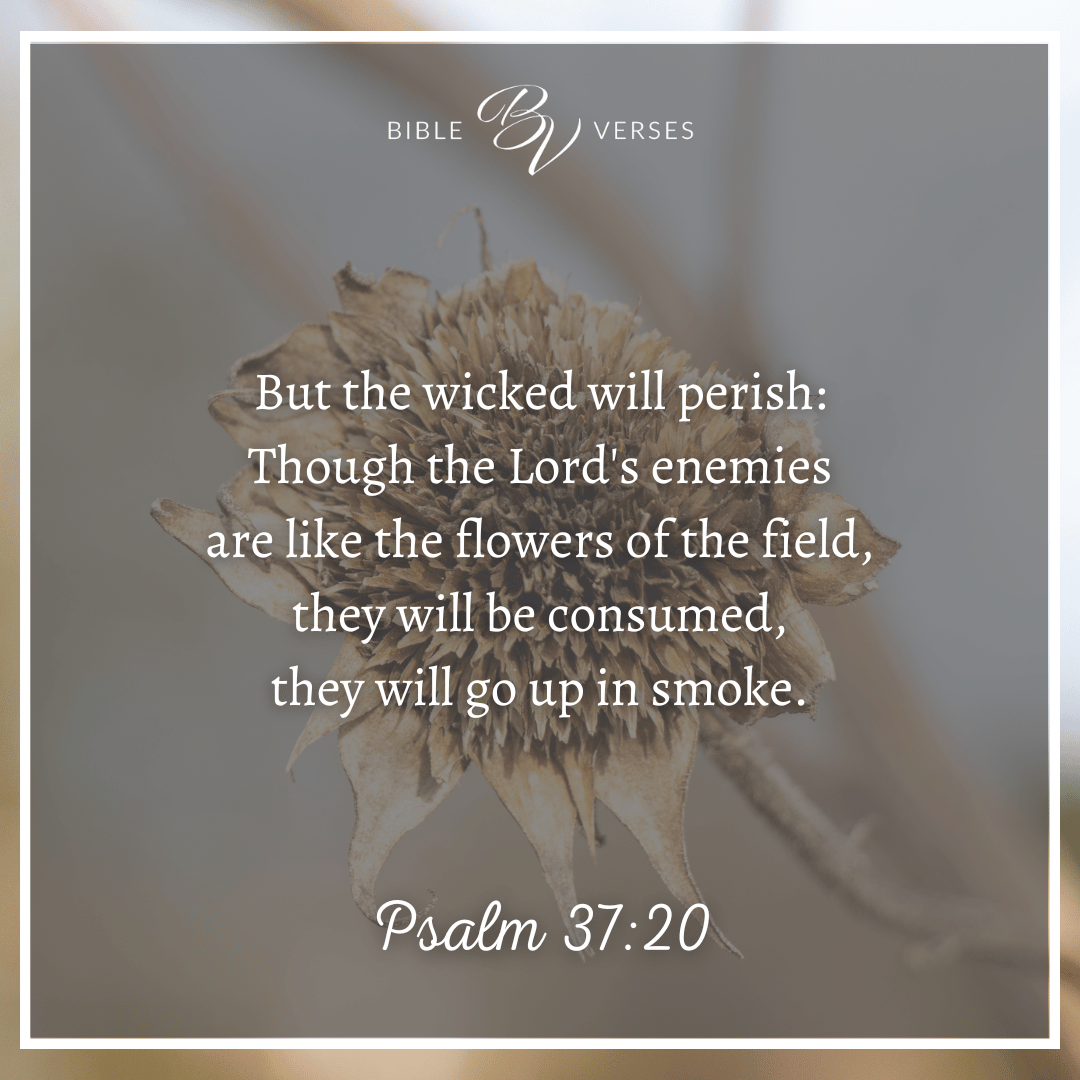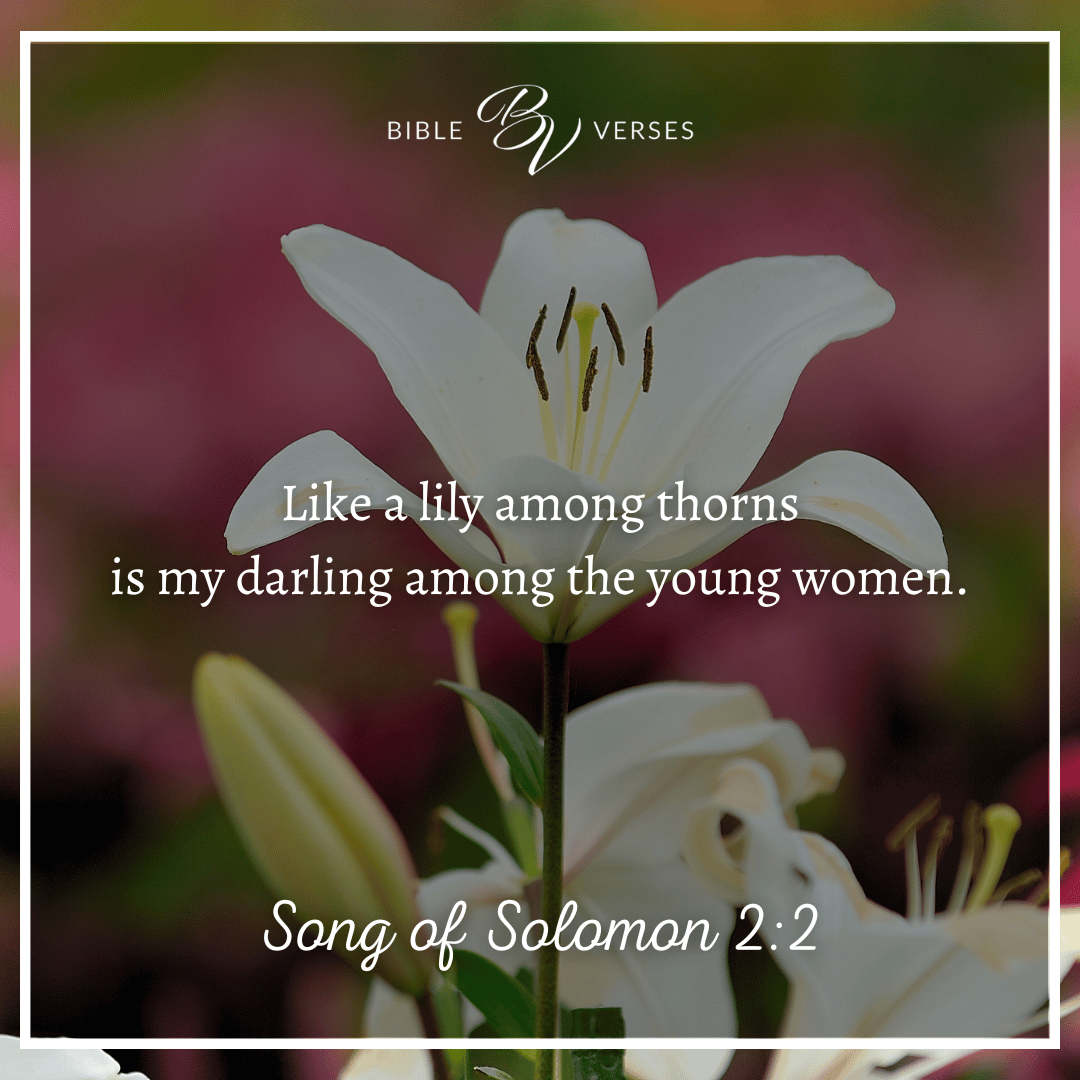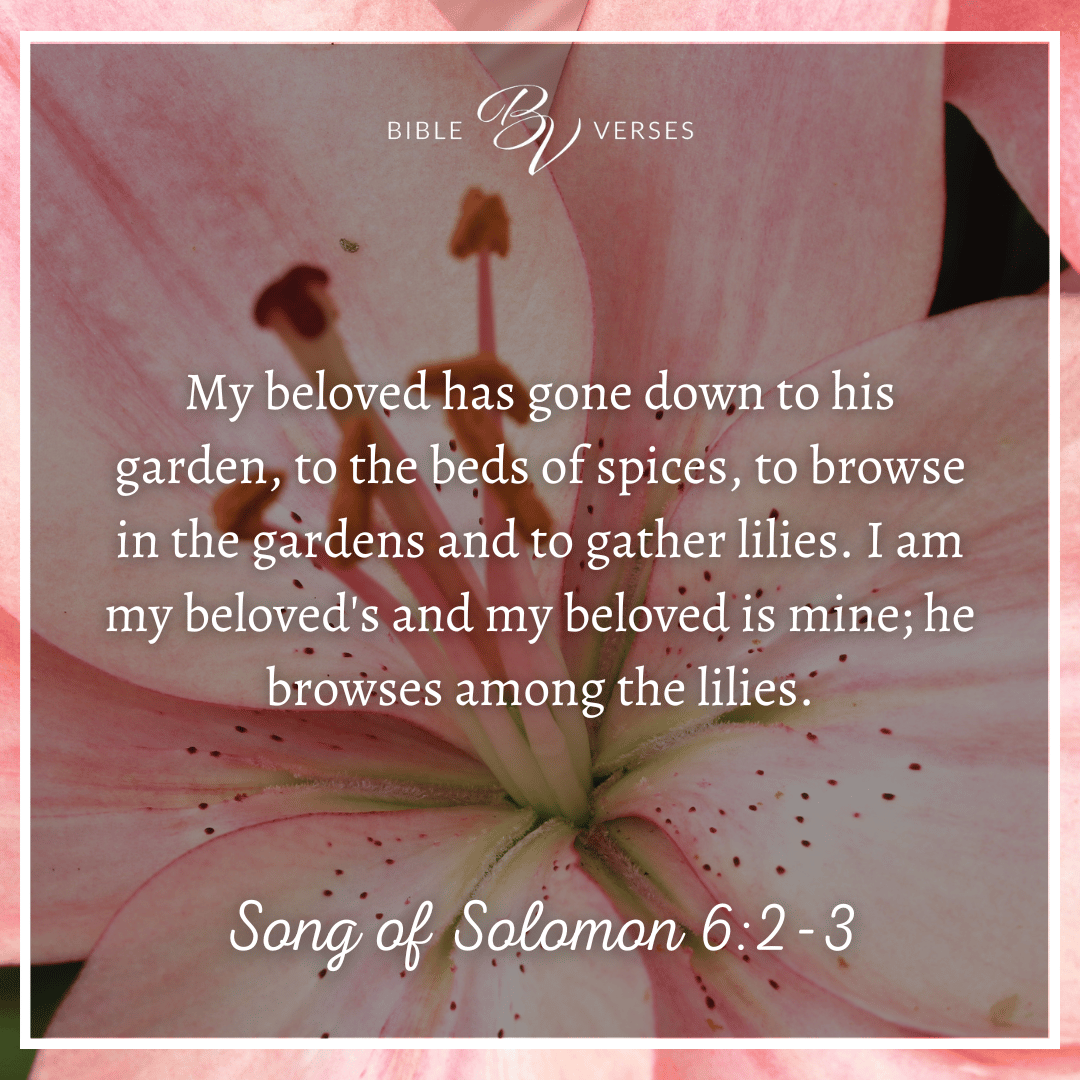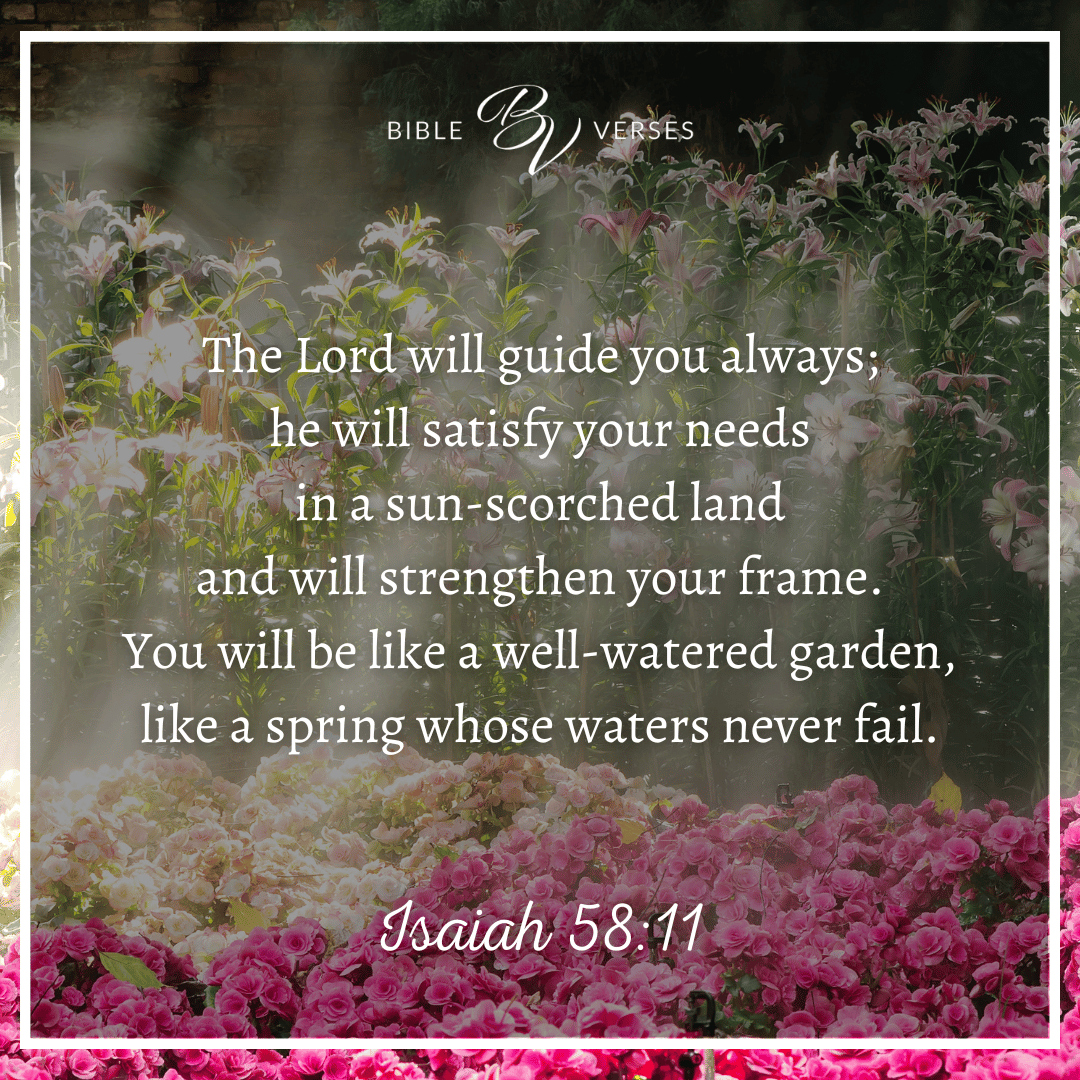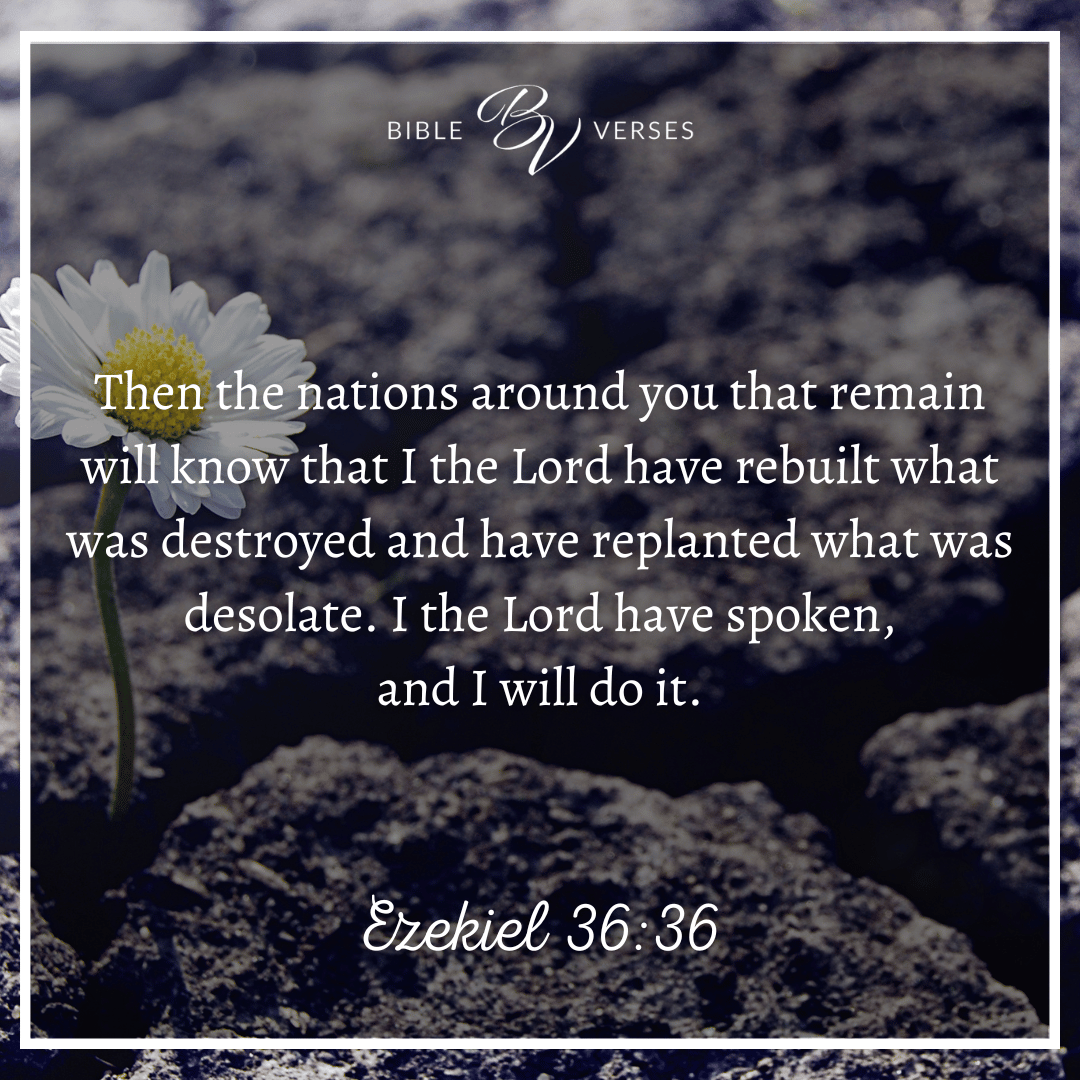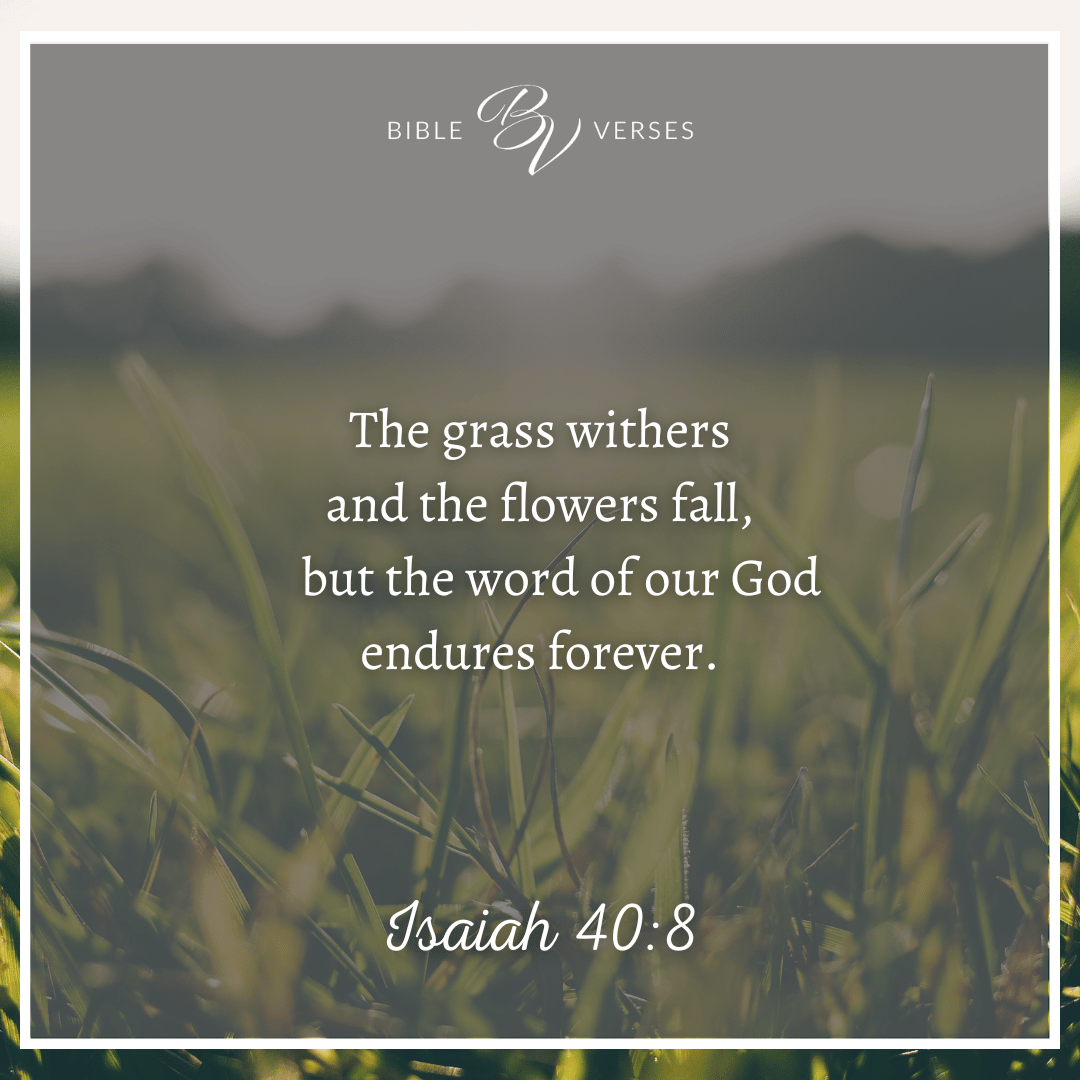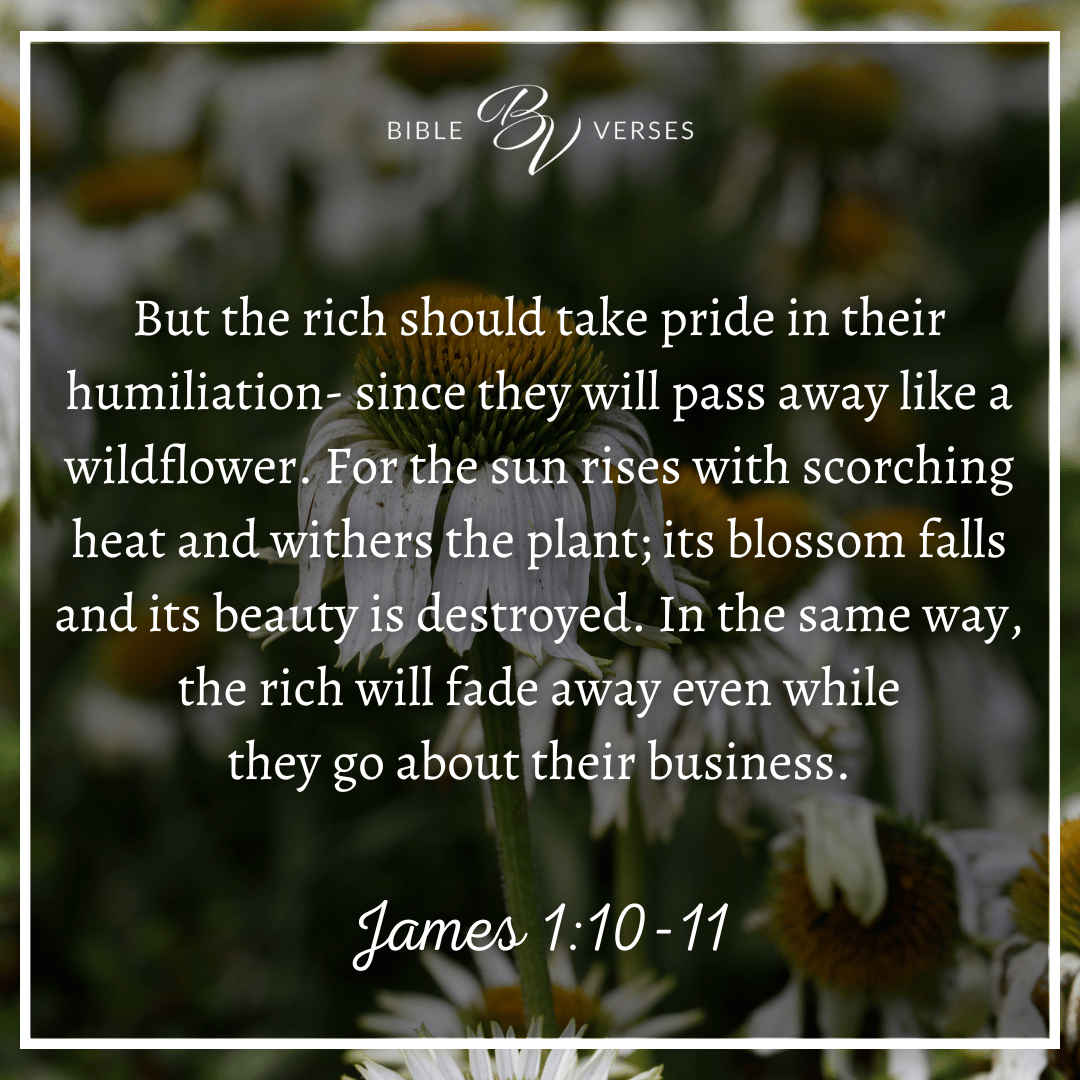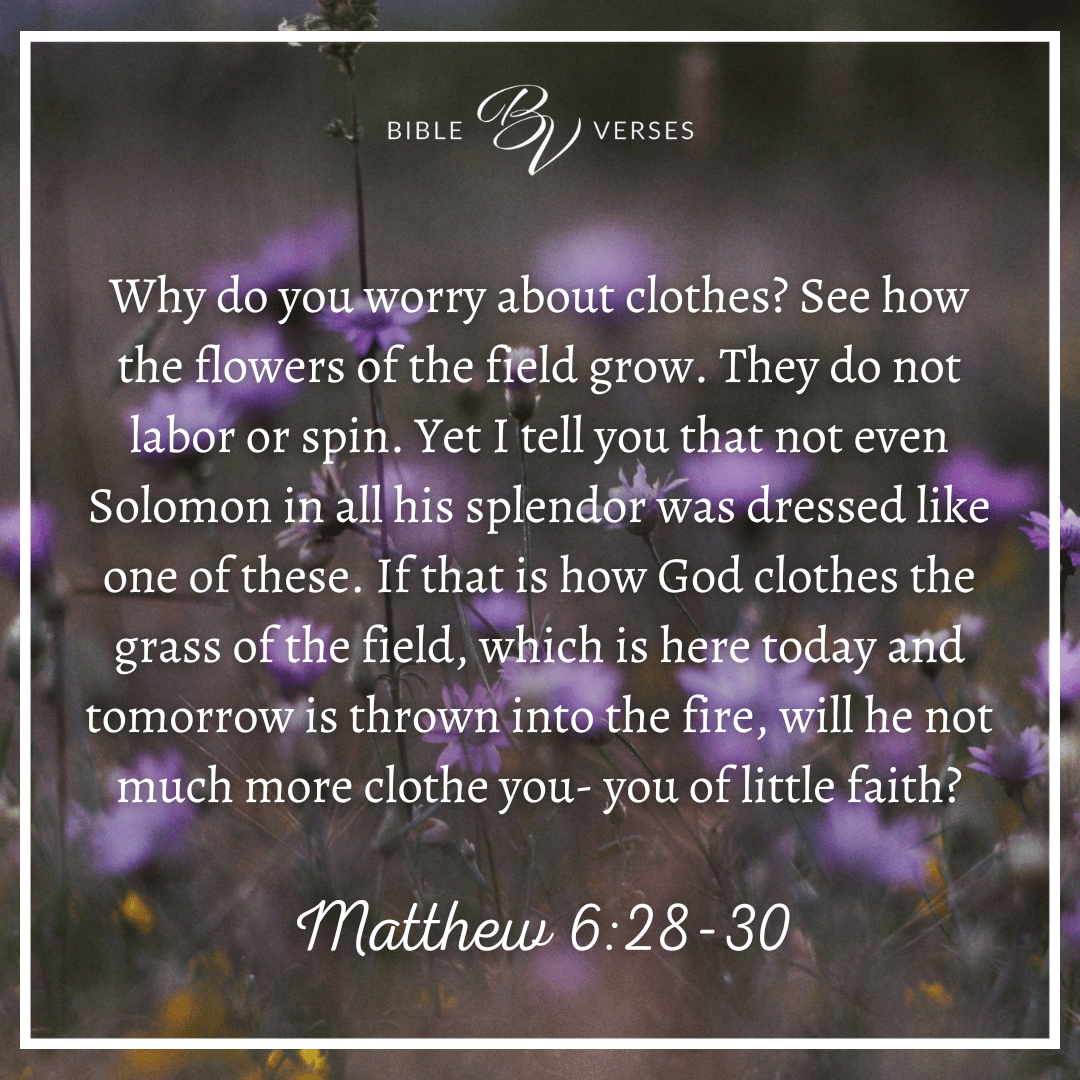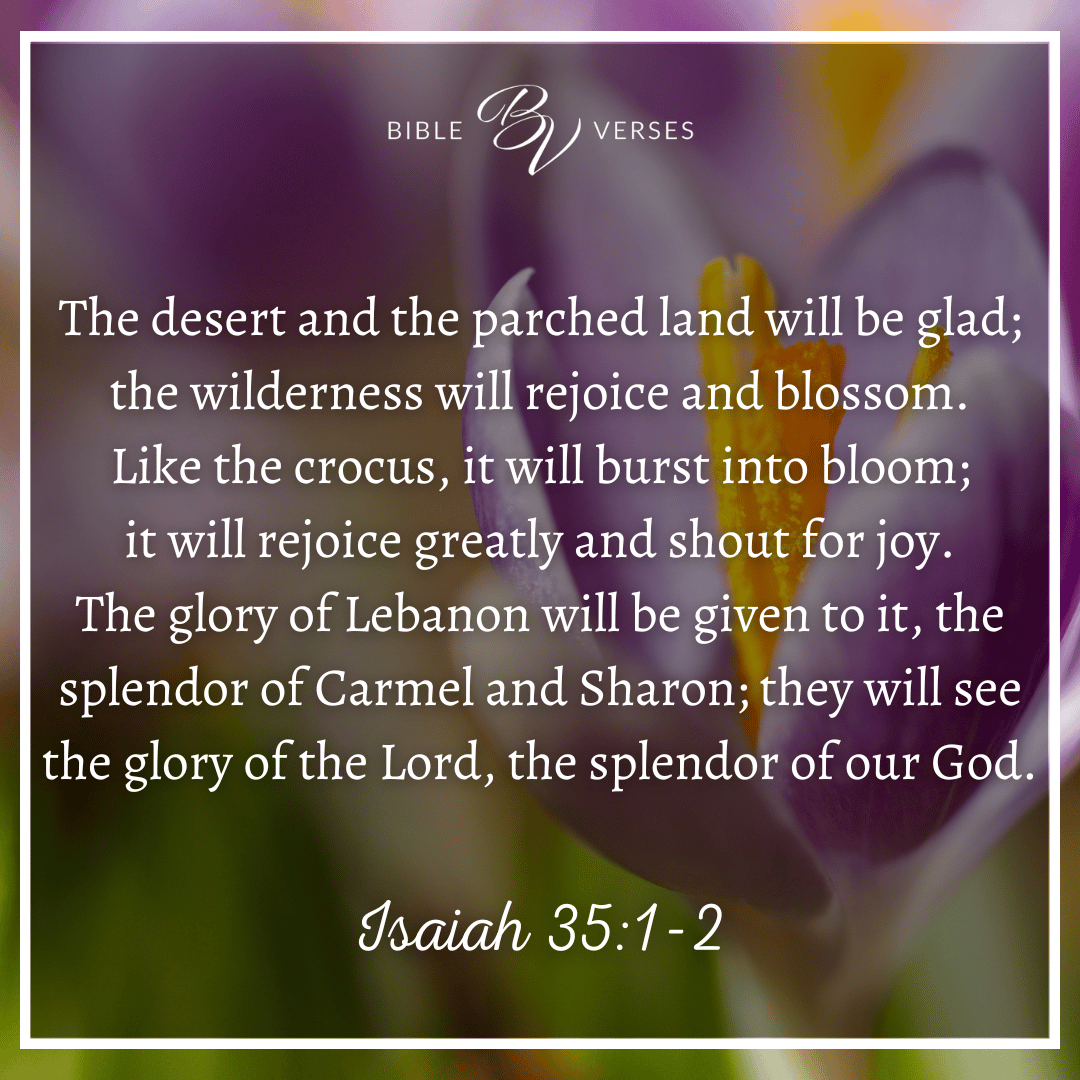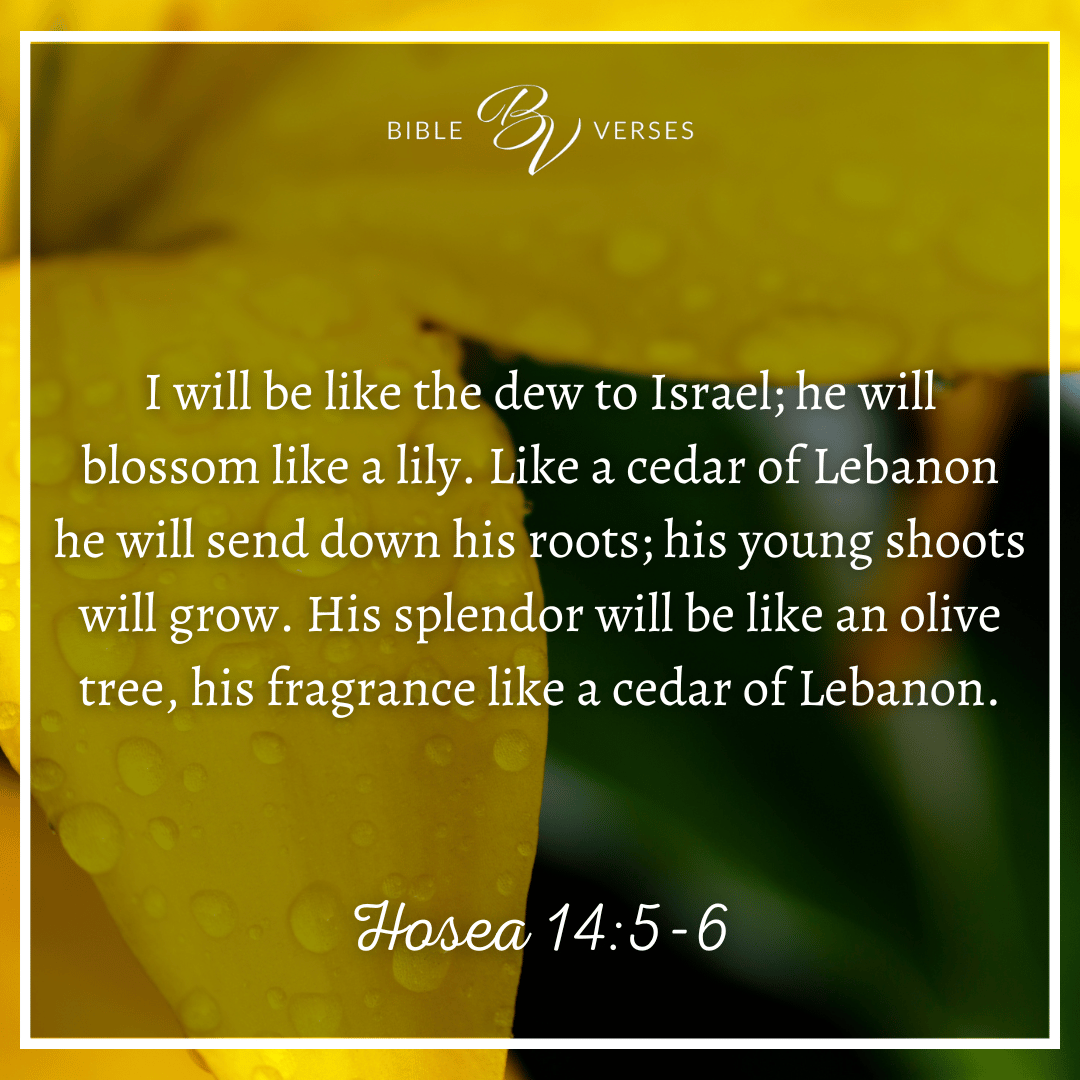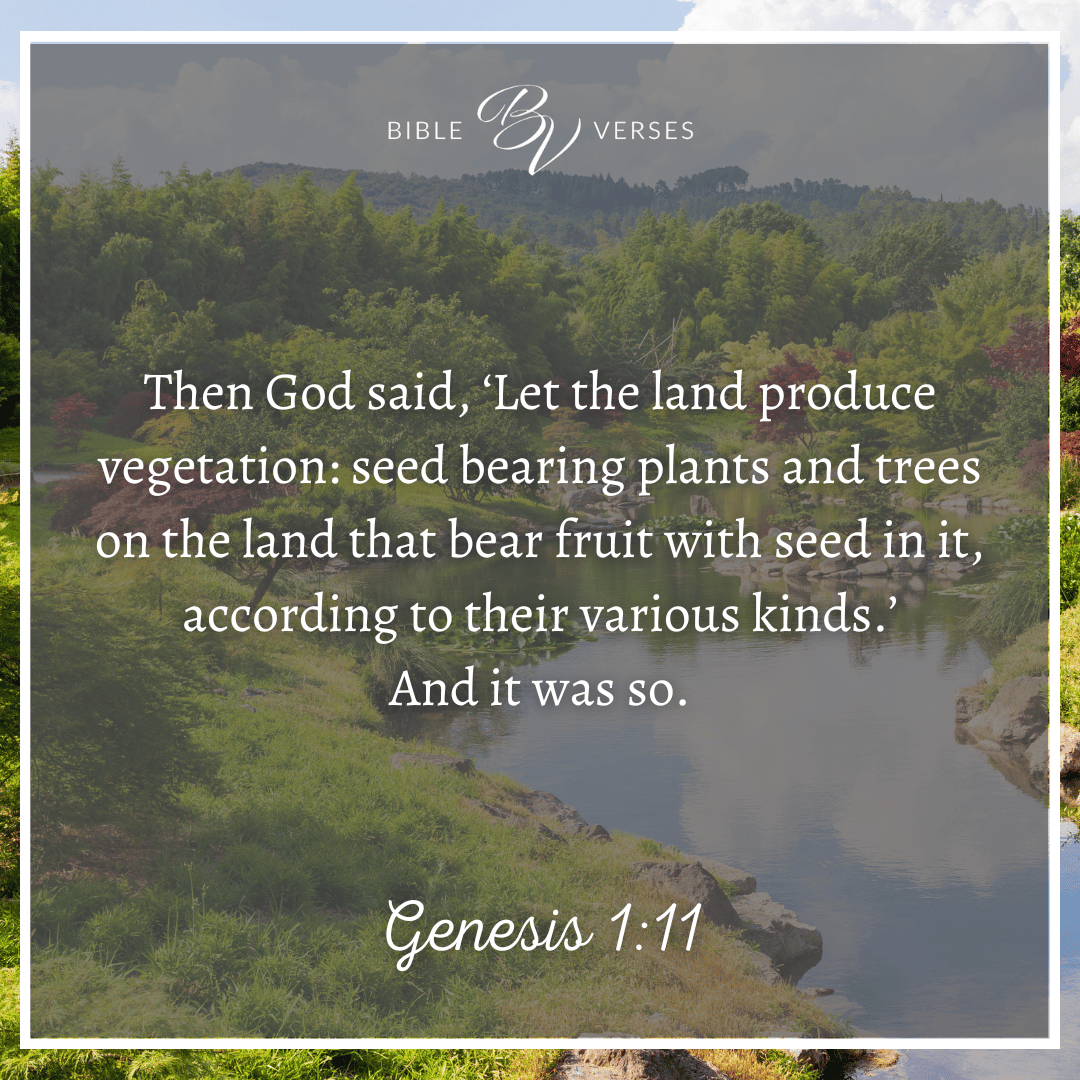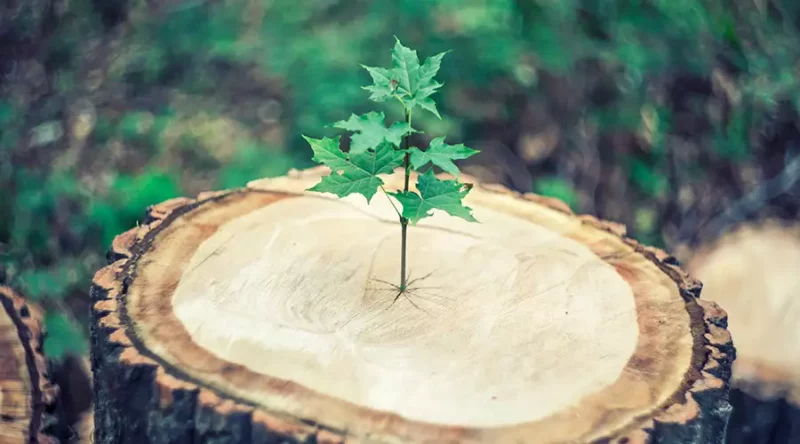A Biblical Bouquet: 15 Bible Verses About Flowers
Flowers are often used in scripture to symbolize beauty, delicacy, and fragility. They serve as reminders of the fleeting nature of life and the transient beauty of earthly existence.
Jesus referenced flowers in his teachings, such as in Matthew 6:28-29, to illustrate God’s provision and care. He pointed out how God clothes the flowers of the field, showcasing His attention to even the smallest details of creation.
Flowers are also used metaphorically to represent growth, renewal, and transformation. Verses like Isaiah 35:1-2 and Hosea 14:5-7 depict flowers blooming in barren landscapes as symbols of God’s ability to bring life and vitality to desolate situations.
Lastly, flowers serve as vivid imagery of God’s creation throughout the Bible, highlighting His creativity, beauty, and sovereignty over all living things.
Let’s take a look at just some of the ways flowers are used throughout scripture…
Biblical Quotes About Flowers
15 Bible Verses About Flowers
Song of Songs 2:12
The flowers appear on the earth; the time of the singing of birds is come, and the voice of the turtle is heard in our land.
Flowers appear on the earth;
the season of singing has come,
the cooing of doves
is heard in our land.
The flowers are springing up,
the season of singing birds has come,
and the cooing of turtledoves fills the air.
The flowers appear on the earth,
the time of singing has come,
and the voice of the turtledove
is heard in our land.
This bible verse about flowers in the Song of Songs is part of a beautiful poetic love song, also known as the Songs of Solomon, found in the Old Testament of the Bible.
This scripture is part of a larger passage in which the beloved (often interpreted as representing either the individual believer or the nation of Israel) speaks of the arrival of spring. It evokes imagery of nature awakening after the cold of winter, with flowers blooming and birds singing. Symbolically, it represents a time of renewal, joy, and love.
Interpretations of the Song of Solomon vary, with some seeing it as an allegory of the love between God and His people, while others interpret it more literally as a celebration of human love and romance. In either case, Song of Solomon 2:12 captures the beauty and vitality of the natural world and the anticipation of joyful times ahead.
1 Peter 1:24-25
For all flesh is as grass, and all the glory of man as the flower of grass. The grass withereth, and the flower thereof falleth away:
But the word of the Lord endureth for ever. And this is the word which by the gospel is preached unto you.
For,
“All people are like grass,
and all their glory is like the flowers of the field;
the grass withers and the flowers fall,
but the word of the Lord endures forever.”
And this is the word that was preached to you.
As the Scriptures say,
“People are like grass;
their beauty is like a flower in the field.
The grass withers and the flower fades.
But the word of the Lord remains forever.”
And that word is the Good News that was preached to you.
For “All flesh is like grass
and all its glory like the flower of grass.
The grass withers,
and the flower falls,
but the word of the Lord remains forever.”
In this passage, Peter draws upon imagery from the Old Testament, particularly from Isaiah 40:6-8, to convey a message about the temporary nature of human life and achievements compared to the enduring truth of God’s Word.
The metaphor of people being like grass and their glory like flowers emphasizes the fleeting nature of human existence and accomplishments. Just as grass withers and flowers fade, so too does human life and all its earthly status. However, amidst this temporariness, Peter asserts the enduring permanence of God’s Word, which stands firm and unchanging throughout time.
Psalm 103:15-17
As for man, his days are as grass: as a flower of the field, so he flourisheth.
For the wind passeth over it, and it is gone; and the place thereof shall know it no more.
But the mercy of the Lord is from everlasting to everlasting upon them that fear him, and his righteousness unto children’s children;
The life of mortals is like grass,
they flourish like a flower of the field;
the wind blows over it and it is gone,
and its place remembers it no more.
But from everlasting to everlasting
the Lord’s love is with those who fear him,
and his righteousness with their children’s children—
Our days on earth are like grass;
like wildflowers, we bloom and die.
The wind blows, and we are gone—
as though we had never been here.
But the love of the Lord remains forever
with those who fear him.
His salvation extends to the children’s children
As for man, his days are like grass;
he flourishes like a flower of the field;
for the wind passes over it, and it is gone,
and its place knows it no more.
But the steadfast love of the Lord is from everlasting to everlasting on those who fear him,
and his righteousness to children’s children.
In this passage, the psalmist reflects on the brevity of human life and the transient nature of earthly existence. The imagery of grass and flowers, which wither and fade away under the passing wind, serves as a metaphor for human life. Just as the grass is here one moment and gone the next, so too are the days of human beings.
However, amidst the acknowledgment of human mortality, the psalmist contrasts this with the everlasting and steadfast love of the Lord. Despite the brief nature of human life, God’s love endures from eternity past to eternity future. It is unchanging, unwavering, and extends to those who fear Him, demonstrating His faithfulness across generations.
Ultimately, Psalm 103:15-17 emphasizes the temporary nature of human existence while highlighting the enduring love and righteousness of God, providing comfort and reassurance to believers in the face of life’s impermanence.
1 Corinthians 3:7-9
So then neither is he that planteth any thing, neither he that watereth; but God that giveth the increase.
Now he that planteth and he that watereth are one: and every man shall receive his own reward according to his own labour.
For we are labourers together with God: ye are God’s husbandry, ye are God’s building.
So neither the one who plants nor the one who waters is anything, but only God, who makes things grow. The one who plants and the one who waters have one purpose, and they will each be rewarded according to their own labor. For we are co-workers in God’s service; you are God’s field, God’s building.
It’s not important who does the planting, or who does the watering. What’s important is that God makes the seed grow. The one who plants and the one who waters work together with the same purpose. And both will be rewarded for their own hard work. For we are both God’s workers. And you are God’s field. You are God’s building.
So neither he who plants nor he who waters is anything, but only God who gives the growth. He who plants and he who waters are one, and each will receive his wages according to his labor. For we are God’s fellow workers. You are God’s field, God’s building.
In this passage, Paul uses the metaphor of planting and watering to illustrate the collaborative nature of Christian ministry and the sovereignty of God in bringing about spiritual growth.
Paul emphasizes that both the one who plants seeds and the one who waters them play essential roles in the process, but ultimately, it is God who provides the increase. Despite the different roles and contributions of individuals within the church community, their efforts are nothing without the work of God.
Furthermore, Paul emphasizes the unity of purpose among believers, describing them as fellow workers with God. Just as a field or a building requires cooperative effort to achieve its purpose, so too does The Church rely on the collective labor of its members, guided and empowered by God.
Overall, 1 Corinthians 3:7-9 serves as a reminder of the importance of humility, cooperation, and reliance on God in Christian ministry, highlighting the central role of our Lord in bringing about spiritual growth and the unity of believers in their shared mission.
Psalm 37:20
But the wicked shall perish, and the enemies of the Lord shall be as the fat of lambs: they shall consume; into smoke shall they consume away.
But the wicked will perish:
Though the Lord’s enemies are like the flowers of the field,
they will be consumed, they will go up in smoke.
But the wicked will die.
The Lord’s enemies are like flowers in a field—
they will disappear like smoke.
But the wicked will perish;
the enemies of the Lord are like the glory of the pastures;
they vanish—like smoke they vanish away.
In this verse, the psalmist contrasts the fate of the wicked with that of the righteous.
The wicked are likened to the flowers of the field, which may appear vibrant and flourishing for a time but ultimately wither and perish. Despite their temporary appearance of prosperity, the psalmist asserts that the wicked will meet their end. Their fate is one of destruction and annihilation, symbolized by being consumed and going up in smoke.
This verse underscores the theme of divine justice and the ultimate triumph of righteousness over wickedness. It serves as a reminder that despite the apparent success or prosperity of the wicked in the short term, their end will be one of utter destruction.
In contrast, the righteous can find assurance in God’s protection and faithfulness, knowing that He will ultimately vindicate them and bring justice to His people.
Song of Songs 2:2
As the lily among thorns, so is my love among the daughters.
Like a lily among thorns
is my darling among the young women.
Like a lily among thistles
is my darling among young women.
As a lily among brambles,
so is my love among the young women.
This bible verse about flowers is part of a love poem between the bridegroom and the bride, which is rich in imagery and symbolism. In this particular verse, the bridegroom compares his beloved to a lily among thorns, highlighting her beauty and uniqueness.
The imagery of a lily among thorns suggests the exceptional beauty and purity of the bride, standing out amidst the surrounding difficulties and challenges represented by the thorns. It conveys the bridegroom’s admiration and affection for his beloved, emphasizing her exquisite qualities compared to others.
In portraying the deep love and admiration between the bridegroom and the bride, this scripture can be applied to earthly relationships between a husband and wife, as well as the greater kingdom picture of Jesus, the bridegroom, coming for His bride, The Church.
Song of Songs 6:2-3
My beloved is gone down into his garden, to the beds of spices, to feed in the gardens, and to gather lilies.
I am my beloved’s, and my beloved is mine: he feedeth among the lilies.
My beloved has gone down to his garden,
to the beds of spices,
to browse in the gardens
and to gather lilies.
I am my beloved’s and my beloved is mine;
he browses among the lilies.
My lover has gone down to his garden,
to his spice beds,
to browse in the gardens
and gather the lilies.
I am my lover’s, and my lover is mine.
He browses among the lilies.
My beloved has gone down to his garden
to the beds of spices,
to graze in the gardens
and to gather lilies.
I am my beloved’s and my beloved is mine;
he grazes among the lilies.
This passage continues the poetic dialogue between the bride and the bridegroom, expressing their mutual love and devotion. The bride speaks of her beloved going down to his garden to enjoy its beauty and fragrance, symbolizing his care and attention.
The imagery of spices and lilies evokes sensory richness and abundance, portraying the garden as a place of delight and pleasure.
The bride then affirms her intimate relationship with her beloved, declaring, “I am my beloved’s and my beloved is mine.” This statement reflects the deep bond and commitment between the bride and the bridegroom, emphasizing their exclusive love and belonging to each other.
Again, this scripture illustrates the love and devotion Jesus has to His bride, The Church, and showcases the closeness God desires to have with us, while also demonstrating the deep love and passion between a husband and wife in a godly marriage.
Isaiah 58:11
And the Lord shall guide thee continually, and satisfy thy soul in drought, and make fat thy bones: and thou shalt be like a watered garden, and like a spring of water, whose waters fail not.
The Lord will guide you always;
he will satisfy your needs in a sun-scorched land
and will strengthen your frame.
You will be like a well-watered garden,
like a spring whose waters never fail.
The Lord will guide you continually,
giving you water when you are dry
and restoring your strength.
You will be like a well-watered garden,
like an ever-flowing spring.
And the Lord will guide you continually
and satisfy your desire in scorched places
and make your bones strong;
and you shall be like a watered garden,
like a spring of water,
whose waters do not fail.
In this verse, the prophet Isaiah delivers a message of hope and assurance to the people of Israel. He speaks of the blessings that come from living in obedience to God’s commands.
The imagery used here is rich and powerful. The verse depicts God as a faithful guide who will always lead His people and provide for their needs, even in difficult times (“a sun-scorched land”). This assurance of divine guidance and provision brings comfort and confidence to the people.
The metaphor of being “like a well-watered garden” and “a spring whose waters never fail” conveys the idea of abundance, vitality, and perpetual refreshment. It symbolizes the blessings that come from walking closely with God and living according to His will. Just as a well-watered garden flourishes and bears fruit, so too will those who trust in the Lord and follow His ways.
Ezekiel 36:36
Then the heathen that are left round about you shall know that I the Lord build the ruined places, and plant that that was desolate: I the Lord have spoken it, and I will do it.
Then the nations around you that remain will know that I the Lord have rebuilt what was destroyed and have replanted what was desolate. I the Lord have spoken, and I will do it.
Then the surrounding nations that survive will know that I, the Lord, have rebuilt the ruins and replanted the wasteland. For I, the Lord, have spoken, and I will do what I say.
Then the surrounding nations that survive will know that I, the Lord, have rebuilt the ruins and replanted the wasteland. For I, the Lord, have spoken, and I will do what I say.
The prophet Ezekiel delivers a message of restoration and renewal. He speaks of God’s promise to rebuild and replant what has been destroyed and left desolate. This promise is not only for the benefit of Israel but also for the surrounding nations.
The verse emphasizes the sovereignty and faithfulness of God. Despite the destruction and desolation experienced by Israel, God assures them that He will intervene to restore what has been lost. This restoration will serve as a testament to the nations surrounding Israel, demonstrating God’s power and faithfulness to fulfill His promises.
Overall, Ezekiel 36:36 highlights God’s commitment to restoring His people and bringing about redemption and renewal, ultimately bringing glory to His name among the nations.
Isaiah 40:8
The grass withereth, the flower fadeth: but the word of our God shall stand for ever.
The grass withers and the flowers fall,
but the word of our God endures forever.
The grass withers and the flowers fade,
but the word of our God stands forever.
The grass withers and the flowers fall,
but the word of our God endures forever.
In contrast to the fleeting nature of human life, Isaiah affirms the enduring truth of God’s Word. Unlike humans, the Word of God stands firm and unchanging throughout time. It is eternal and immutable, providing a source of truth, guidance, and comfort for God’s people across generations.
Overall, Isaiah 40:8 underscores the reliability and permanence of God’s Word, encouraging believers to place their trust and confidence in its timeless truths amidst the ever-changing circumstances of life.
Peter refers to this bible verse about flowers in 1 Peter 1:24, as mentioned above.
James 1:10-11
But the rich, in that he is made low: because as the flower of the grass he shall pass away.
For the sun is no sooner risen with a burning heat, but it withereth the grass, and the flower thereof falleth, and the grace of the fashion of it perisheth: so also shall the rich man fade away in his ways.
But the rich should take pride in their humiliation—since they will pass away like a wild flower. For the sun rises with scorching heat and withersthe plant; its blossom falls and its beauty is destroyed. In the same way, the rich will fade away even while they go about their business.
And those who are rich should boast that God has humbled them. They will fade away like a little flower in the field. The hot sun rises and the grass withers; the little flower droops and falls, and its beauty fades away. In the same way, the rich will fade away with all of their achievements.
And the rich in his humiliation, because like a flower of the grass he will pass away. For the sun rises with its scorching heat and withers the grass; its flower falls, and its beauty perishes. So also will the rich man fade away in the midst of his pursuits.
In these verses, James addresses the issue of wealth and earthly possessions. He contrasts the fate of the rich with that of a wildflower, which blooms briefly but is soon withered by the scorching heat of the sun. Despite their apparent prosperity, the rich will ultimately pass away like the wilting flower.
James warns against placing too much emphasis on material possessions and earthly success, as they are ultimately fleeting and will not endure.
Instead, James encourages the rich to find their true worth and identity in humility before God. Rather than boasting in their wealth, they should recognize their dependence on God and prioritize spiritual riches over material wealth.
Matthew 6:28-30
And why take ye thought for raiment? Consider the lilies of the field, how they grow; they toil not, neither do they spin:
And yet I say unto you, That even Solomon in all his glory was not arrayed like one of these.
Wherefore, if God so clothe the grass of the field, which to day is, and to morrow is cast into the oven, shall he not much more clothe you, O ye of little faith?
And why do you worry about clothes? See how the flowers of the field grow. They do not labor or spin. Yet I tell you that not even Solomon in all his splendor was dressed like one of these. If that is how God clothes the grass of the field, which is here today and tomorrow is thrown into the fire, will he not much more clothe you—you of little faith?
And why worry about your clothing? Look at the lilies of the field and how they grow. They don’t work or make their clothing, yet Solomon in all his glory was not dressed as beautifully as they are. And if God cares so wonderfully for wildflowers that are here today and thrown into the fire tomorrow, he will certainly care for you. Why do you have so little faith?
And why are you anxious about clothing? Consider the lilies of the field, how they grow: they neither toil nor spin, yet I tell you, even Solomon in all his glory was not arrayed like one of these. But if God so clothes the grass of the field, which today is alive and tomorrow is thrown into the oven, will he not much more clothe you, O you of little faith?
In this passage, Jesus uses the imagery of flowers in the field to teach a lesson about worry and trust in God’s provision. He points out how the flowers, though they neither work nor spin cloth like humans do, are beautifully clothed by God in even greater splendor than King Solomon, who was renowned for his wealth and luxury.
Jesus then contrasts the flowers, which wither and are thrown into the fire, with God’s enduring care and provision for His people. If God clothes the grass of the field with such beauty, how much more will He provide for His beloved children?
The passage concludes with a gentle rebuke to those of “little faith,” reminding them of God’s faithfulness and urging them not to worry excessively about their material needs. Instead, Jesus encourages his listeners to seek first the kingdom of God and His righteousness, trusting that all their needs will be provided for by their Heavenly Father.
Isaiah 35:1-2
The wilderness and the solitary place shall be glad for them; and the desert shall rejoice, and blossom as the rose. It shall blossom abundantly, and rejoice even with joy and singing: the glory of Lebanon shall be given unto it, the excellency of Carmel and Sharon, they shall see the glory of the Lord, and the excellency of our God.
The desert and the parched land will be glad;
the wilderness will rejoice and blossom.
Like the crocus, it will burst into bloom;
it will rejoice greatly and shout for joy.
The glory of Lebanon will be given to it,
the splendor of Carmel and Sharon;
they will see the glory of the Lord,
the splendor of our God.
Even the wilderness and desert will be glad in those days.
The wasteland will rejoice and blossom with spring crocuses.
Yes, there will be an abundance of flowers
and singing and joy!
The deserts will become as green as the mountains of Lebanon,
as lovely as Mount Carmel or the plain of Sharon.
There the Lord will display his glory,
the splendor of our God.
The wilderness and the dry land shall be glad;
the desert shall rejoice and blossom like the crocus;
it shall blossom abundantly
and rejoice with joy and singing.
The glory of Lebanon shall be given to it,
the majesty of Carmel and Sharon.
They shall see the glory of the Lord,
the majesty of our God.
Here, Isaiah prophesies about a future time of restoration and renewal. He uses vivid imagery to describe the transformation of barren and desolate landscapes into flourishing and vibrant gardens.
Isaiah begins by describing the desert and parched land rejoicing and blossoming. He compares this transformation to the blooming of the crocus, a flower known for its beauty and resilience. This imagery symbolizes the miraculous renewal of the land, bringing forth abundant life and joy.
The prophet goes on to mention the glory of Lebanon, the splendor of Carmel, and the beauty of Sharon, which were regions known for their lush vegetation and fertility. These references further emphasize the idea of abundant blessings and prosperity bestowed upon the restored land.
Isaiah 35:1-2 portrays a vision of God’s transformative power, bringing life and vitality to places that were once a wasteland. It serves as a message of hope and encouragement, reminding the people of Israel of God’s faithfulness and His promise to bring about restoration and renewal in a way that only He can do.
Hosea 14:5-6
I will be as the dew unto Israel: he shall grow as the lily, and cast forth his roots as Lebanon.
His branches shall spread, and his beauty shall be as the olive tree, and his smell as Lebanon.
I will be like the dew to Israel;
he will blossom like a lily.
Like a cedar of Lebanon
he will send down his roots;
his young shoots will grow.
His splendor will be like an olive tree,
his fragrance like a cedar of Lebanon.
I will be to Israel
like a refreshing dew from heaven.
Israel will blossom like the lily;
it will send roots deep into the soil
like the cedars in Lebanon.
Its branches will spread out like beautiful olive trees,
as fragrant as the cedars of Lebanon.
I will be like the dew to Israel;
he shall blossom like the lily;
he shall take root like the trees of Lebanon;
his shoots shall spread out;
his beauty shall be like the olive,
and his fragrance like Lebanon.
Similarly to Isaiah 35:1-2, Hosea 14:5-6 use imagery to paint a picture of spiritual renewal and growth.
God promises to be like the dew to Israel, providing refreshment, nourishment, and vitality. This imagery symbolizes God’s grace and favor, which bring about the flourishing and blossoming of His people.
The mention of Israel blossoming like a lily and sending down roots like a cedar of Lebanon emphasizes the strength, stability, and beauty that God will bring to His people through His blessings. The lily and cedar are both symbols of growth, strength, and splendor, indicating the transformation and prosperity that God will bestow upon Israel.
Additionally, the reference to the olive tree and its fragrance further highlights the richness and abundance of God’s blessings. The olive tree is a symbol of prosperity and peace, and its fragrance evokes a sense of sweetness and delight.
Genesis 1:11
And God said, Let the earth bring forth grass, the herb yielding seed, and the fruit tree yielding fruit after his kind, whose seed is in itself, upon the earth: and it was so.
Then God said, “Let the land produce vegetation: seed-bearing plants and trees on the land that bear fruit with seed in it, according to their various kinds.” And it was so.
Then God said, “Let the land sprout with vegetation—every sort of seed-bearing plant, and trees that grow seed-bearing fruit. These seeds will then produce the kinds of plants and trees from which they came.” And that is what happened.
And God said, “Let the earth sprout vegetation, plants yielding seed, and fruit trees bearing fruit in which is their seed, each according to its kind, on the earth.” And it was so.
This verse is part of the creation narrative in which God brings forth vegetation on the third day of creation. It highlights God’s creative power and intentionality in forming the natural world.
In Genesis 1:11, God commands the land to produce vegetation, including seed-bearing plants and trees that bear fruit. This command results in diverse plant life across the earth, each according to its own kind.
The verse underscores the order and purpose in God’s creation, as vegetation is provided not only for aesthetic beauty but also for sustenance and reproduction. It establishes the foundation for the abundance of plant life that will play a crucial role in supporting and sustaining the ecosystem of the newly formed world.
Overall, Genesis 1:11 illustrates God’s role as the ultimate Creator, bringing forth life and abundance through His spoken word. It sets the stage for the continuation of creation, demonstrating God’s sovereignty over the natural world and His provision for all living creatures.


